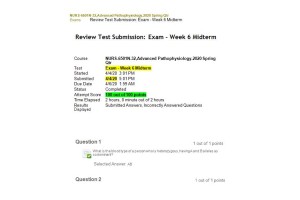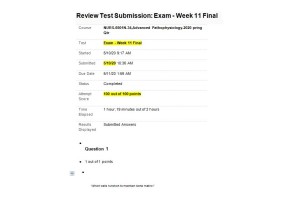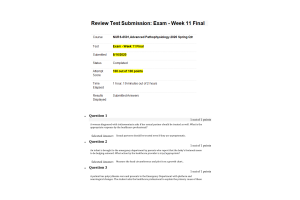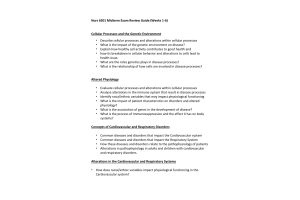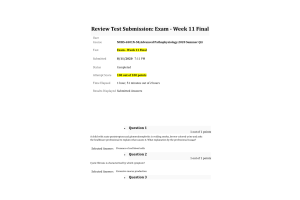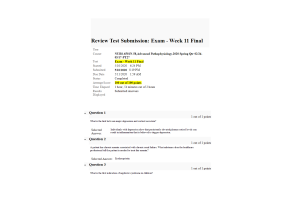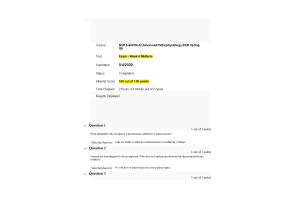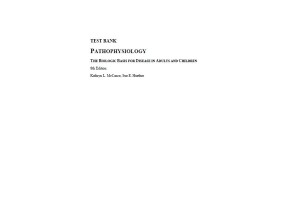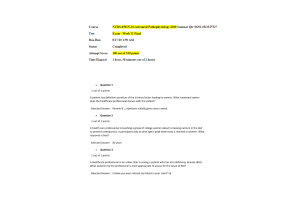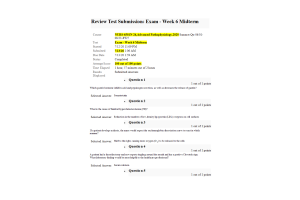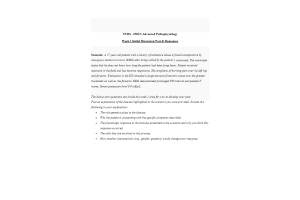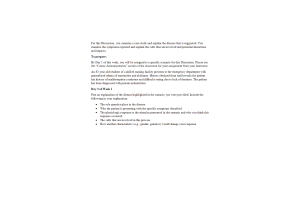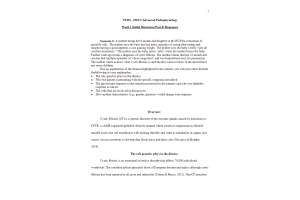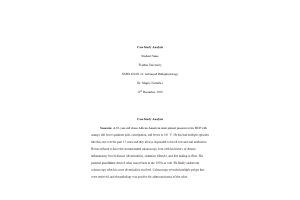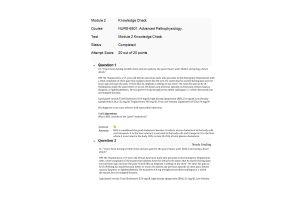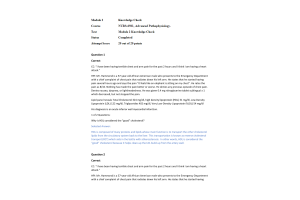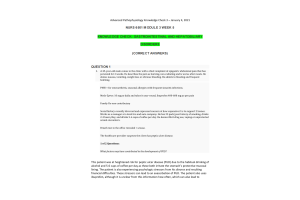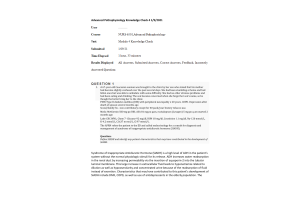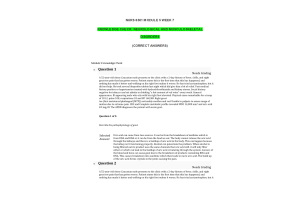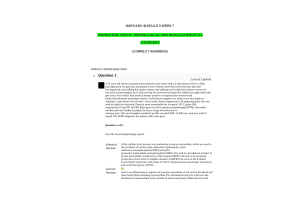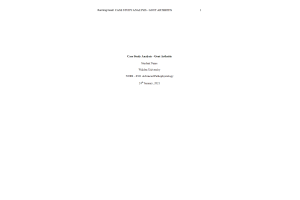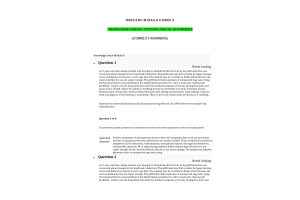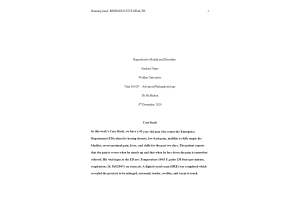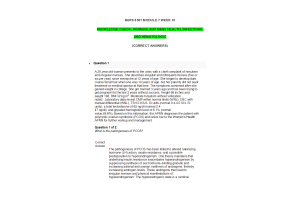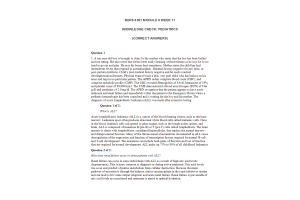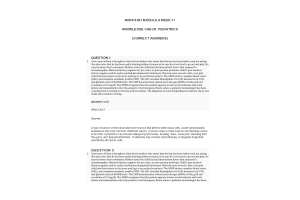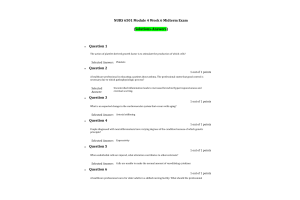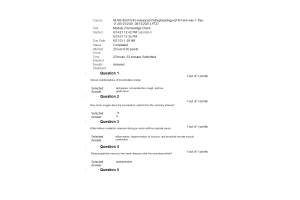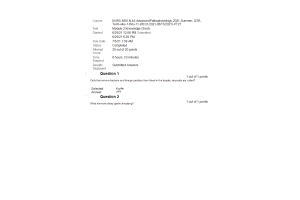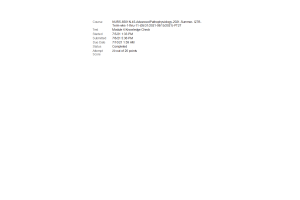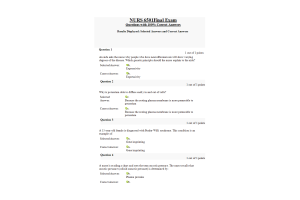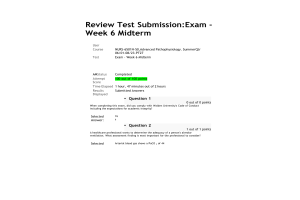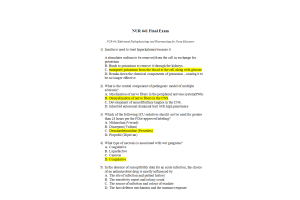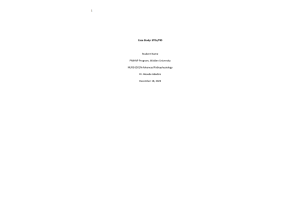NURS 6501 Week 6 Midterm Exam
- $39.00
- Question: Which of the following affects drug distribution throughout the body?
- Question: A Nurse Practitioner who provides care in a long-term care facility is documenting a new resident's medication regimen on the resident's intake admission. The Nurse Practitioner is documenting the generic, rather than proprietary, names of the resident's current drugs because
- Question: A patient is admitted to the emergency department with severe chest pain. The emergency department physician orders intravenous nitroglycerin 5 mcg/min, titrate dose by 5 mcg/min every 3 to 5 minutes per infusion pump as needed. Before administering the nitroglycerin, the nurse should prioritize which of the following assessments?
- Question: A male patient is to begin treatment for pneumonia with an albuterol (Ventolin) inhaler. The nurse will advise the patient that he will most likely experience which of the following common adverse effects of the drug?
- Question: A patient with type 1 diabetes has been admitted to the hospital for orthopedic surgery and the care team anticipates some disruptions to the patient's blood glucose levels in the days following surgery. Which of the following insulin regimens is most likely to achieve adequate glycemic control?
- Question: The APRN's ability to prescribe controlled substances is regulated by:
- Question: A patient has been prescribed an oral drug that is known to have a high first-pass effect. Which of the following measures has the potential to increase the amount of the free drug that is available to body cells?
- Question: Federal legislation dictates a lengthy and rigorous process of testing for new drugs. What is the primary purpose of this testing process?
- Question: A 66-year-old woman has a complex medical history that includes poorly-controlled type 1 diabetes, renal failure as a result of diabetic nephropathy and chronic heart failure (CHF). Her care provider has recently added spironolactone (Aldactone) to the woman's medication regimen. The nurse should consequently assess for signs and symptoms of
- Question: The lower respiratory system utilizes a number of different mechanisms that confer protection and maintain homeostasis. Which of the following physiological processes protects the lower respiratory system?
- Question: A 22 years old patient is transitioning from oral agents to insulin. He will be taking 20 units of lantus at bedtime and regular insulin before meals. What instructions should the NP provide about the timing and dose of regular insulin?
- Question: A Nurse Practitioner who provides care on an acute medicine unit has frequently recommended the use of nicotine replacement gum for patients who express a willingness to quit smoking during their admission or following their discharge. For which of the following patients would nicotine gum be contraindicated?
- Question: A Nurse Practitioner is caring for a female patient who has developed atelectasis because of thick mucus secretions. The Nurse Practitioner is monitoring IV administration of acetylcysteine (Mucomyst) and notices that the patient's face is flushed. The appropriate nursing action would be to
- Question: A Nurse Practitioner is caring for a 70-year-old patient who is taking desmopressin (DDAVP). The patient has a history of cardiovascular disease. The nurse will prioritize the assessment of which of the following?
- Question: Shirley, age 58, has been diabetic for 7 years. Her blood pressure for the last three office visits have been 154/100, 144/94, and 144/90. What would you prescribe today during her routine office visit?
- Question: John is a newly diagnosed diabetic that contacts the office with complaints of severe nausea and vomiting. What instructions should the APRN provide related to his insulin doses?
- Question: A patient comes to primary clinic for strep throat. A throat swab culture is sent to lab. What information is required for the nurse practitioner to disclose on lab transmittal?
- Question: A Nurse Practitioner is caring for a 73-year-old man who is receiving drug therapy. He is beginning to exhibit signs of decline in his renal system, yet his current serum creatinine level is normal. The Nurse Practitioner will base the patient's plan of care on the understanding that there is
- Question: A Nurse Practitioner is caring for a 61-year-old man who has had a severe attack of gout while in the hospital for food poisoning. The Nurse Practitioner administers colchicine intravenously in order to
- Question: A child is prescribed an inhaled corticosteroid agent to decrease respiratory inflammation related to exposure to an animal. The patient’s parent administers a higher than prescribe dose of the medication for 5 days. What should the APRN monitor the child for?
- Question: A Nurse Practitioner is instructing a patient who was recently diagnosed with multiple sclerosis about dantrolene (Dantrium). The patient is a 38-year-old-male and the foreman for a construction company. In order to minimize one important adverse effect of the drug, the nurse will give the patient which of the following instructions?
- Question: A Nurse Practitioner is instructing a patient concerning a newly prescribed drug. Which of the following should be included to help improve patient compliance and safety?
- Question: A 47-year-old woman has been diagnosed with open-angle glaucoma. Pilocarpine drops are prescribed. The nurse's assessment reveals that the patient has worn soft contact lenses for 15 years. The nurse will instruct the patient to
- Question: A Nurse Practitioner is teaching an older adult patient about polypharmacy. Which of the following statements best describe this term?
- Question: A patient has been prescribed rabeprazole (Aciphex). It will be important for the nurse to assess the patient's drug history to determine if the patient is taking which of the following drugs?
- Question: A 60-year-old man has scheduled a follow-up appointment with his primary care provider stating that the omeprazole (Prilosec) which he was recently prescribed is ineffective. The patient states, "I take it as soon as I feel heartburn coming on, but it doesn't seem to help at all." How should the nurse best respond to this patient's statement?
- Question: A mother brings her 4-year-old child, who is vomiting and has a temperature of 103°F into the emergency department (ED). The ED physician orders acetaminophen (Tylenol) for the fever. The best form of Tylenol to give the child, considering her presentation, would be
- Question: Which of the following patients is most likely to benefit from the administration of an adrenergic agonist?
- Question: A Nurse Practitioner is caring for a patient who is diabetic and has been diagnosed with hypertension. An angiotensin-converting enzyme inhibitor, captopril, has been prescribed for her. Which of the following should the Nurse Practitioner assess before beginning drug therapy?
- Question: An elderly patient with a history of congestive heart failure has been admitted to hospital with failure to thrive and admission blood work reveals a hemoglobin level of 6.9 g/dL. The care team has consequently administered two units of packed red blood cells, but auscultation of the client's lungs now reveals diffuse crackles. Administration of what drug is likely to resolve the patient's pulmonary edema?
- Question: An expected outcome for a patient who has just taken sublingual nitroglycerin should be
- Question: An elderly postsurgical patient has developed postoperative pneumonia in the days following abdominal surgery and is being treated with a number of medications. Which of the following medications that the nurse will administer has the slowest absorption?
- Question: A female patient has been taking prednisone for her asthma for 1 month. The nurse will teach her to gradually decrease her dose of prednisone to avoid
- Question: A high school student was diagnosed with asthma when he was in elementary school and has become accustomed to carrying and using his "puffers". In recent months, he has become more involved in sports and has developed a habit of administering albuterol up to 10 times daily. The nurse should teach the student that overuse of albuterol can lead to
- Question: Which of the following statements best defines how a chemical becomes termed a drug?
- Question: A Nurse Practitioner is providing discharge planning for a 45-year-old woman who has a prescription for oral albuterol. The Nurse Practitioner will question the patient about her intake of which of the following?
- Question: Which of the following is TRUE about long acting beta agonist use in asthma patients?
- Question: Topical inhaled alpha adrenergic blocking agents or nasal vasoconstricting decongestants should not be used chronically (>5 days) because they can cause
- Question: A Nurse Practitioner is administering drugs to a 70-year-old patient who has a reduced plasma albumin level. When assessing the patient for therapeutic outcomes of drug therapy, the Nurse Practitioner will also be careful to observe for
- Question: A Nurse Practitioner who provides care in a busy clinic is aware of the high incidence and prevalence of hyperlipidemia and the consequent need for antihyperlipidemics in many patients. Treatment of high cholesterol using statins would be contraindicated in which of the following patients?
- Question: After a recent history of shortness of breath that has become increasingly severe, a woman has been prescribed ipratropium by MDI while she undergoes a diagnostic workup. What patient teaching should the nurse provide to this patient?
- Question: To maximize the therapeutic effect of diphenoxylate HCl with atropine sulfate, the nurse will instruct the patient to take the medication
- Question: A Nurse Practitioner is caring for a male patient who has a diagnosis of coronary artery disease (CAD). His drug therapy includes lovastatin. Because the patient has a history of severe renal disease, the nurse will assess for which of the following?
- Question: A patient is being treated for respiratory infection. He is a recovering alcoholic and has impaired liver function. The nurse will instruct the patient to be especially cautious when taking
- Question: A 48-year-old woman who works as an office manager is prescribed metoclopramide (Reglan) for diabetic gastroparesis. The nurse will be sure to assess the patient for
- Question: A patient will begin three new medications as part of her treatment plan. The nurse practitioner understands that proper disposal of medications is key when the nurse practitioner states
- Question: A 58-year-old man is admitted to the emergency department. A diagnosis of severe digoxin toxicity is made. Bradycardia is present, and an electrocardiogram (ECG) confirms toxicity. The nurse will administer which of the following drugs?
- Question: A 20-year-old woman calls the clinic at 5 PM and reports to the Nurse Practitioner that she forgot to take her morning dose of fexofenadine (Allegra). She usually takes her evening dose at 8 PM. She wants to know what she should do. The Nurse Practitioner will instruct her to
- Question: A 62-year-old woman has been prescribed a fentanyl transdermal patch for chronic cancer pain. The patient asks the nurse how long it will take for her to experience pain relief. The nurse will instruct the patient that she should feel pain relief in approximately
- Question: A teenage boy has undergone a diagnostic workup following several months of persistent, bloody diarrhea that appears to lack an infectious etiology. The boy has also experienced intermittent abdominal pain and has lost almost 15 pounds this year. Which of the following medications is most likely to treat this boy's diagnosis?
- Question: A 79-year-old woman with a medical history that includes osteoporosis has recently moved to a long-term care facility. Medication reconciliation indicates that the woman has been taking calcitonin, salmon for several years. The nurse should recognize that the most likely route for the administration of this drug is
- Question: A patient has recently been prescribed a drug that treats his hypertension by blocking the sympathetic receptors in his sympathetic nervous system. This action is characteristic of
- Question: To minimize the risk of adverse effects of glucagon when given to an unconscious diabetic patient, as the patient regains consciousness, the nurse should
- Question: A Nurse Practitioner is overseeing the care of a young man whose ulcerative colitis is being treated with oral prednisone. Which of the following actions should the Nurse Practitioner take in order to minimize the potential for adverse drug effects and risks associated with prednisone treatment?
- Question: A 22-year-old male college senior has lived with a diagnosis of Crohn's disease for several years and has undergone several courses of treatment with limited benefit. Which of the following targeted therapies has the potential to alleviate the symptoms of Crohn's disease?
- Question: A patient receives 25 units of NPH insulin at 7.AM. At what time of day should the nurse advise the patient to be most alert for a potential hypoglycemic reaction?
- Question: The APRN would use what class of medication to manage COPD?
- Question: A 35 years old patient presents with a concern of two high blood pressures at local health fairs in the past month. The patient has a history of Type 2 Diabetes, Chronic Constipation, and Obesity. Today her pressure is 145/93. You will:
- Question: A 79-year-old patient in a long-term care facility is to receive an intravenous fat emulsion. Which of the following lab values would be a priority for the nurse to assess before administration?
- Question: A patient with bronchial asthma is prescribed a sustained-release preparation of theophylline. To help minimize the adverse effects of the drug, which of the following should the nurse suggest?
- Question: A Nurse Practitioner is providing a patient with a list of drugs as a part of the patient's plan of care. Which of the following drug nomenclatures should the Nurse Practitioner use to list the drugs?
- Question: A 60-year-old African-American man lives with a number of chronic health problems. Genetic factors are likely to influence his etiology and/or treatment of
- Question: The Nurse Practitioner is conducting a medication reconciliation of a new resident of a long-term care facility. The Nurse Practitioner notes that the resident takes allopurinol on a daily basis for the treatment of gout. What is the primary purpose of this drug?
- Question: A patient with a long history of alcohol abuse has been admitted to an acute medical unit with signs and symptoms of hepatic encephalopathy. His current medication orders include QID doses of oral lactulose. What desired outcomes should the nurse associate with this drug order?
- Question: A 49-year-old woman has been diagnosed with myalgia. The physician has recommended aspirin. The patient is concerned that the aspirin will upset her stomach. The nurse will encourage the patient to
- Question: A 72-year-old female patient is prescribed ipratropium aerosol for pulmonary emphysema. The nurse will instruct her to "test spray" the new metered-dose inhaler (MDI) three times before using it to prevent which of the following?
- Question: A patient with diabetes has had a cough for 1 week and has been prescribed a cough syrup (an expectorant). What special instructions should the nurse include in the patient teaching for this situation?
- Question: A Nurse Practitioner is the cardiac care unit is preparing to hang an intravenous dose of dofetilide (Tikosyn) for a patient who has just been admitted. What is the most likely goal of this intervention?
- Question: A Nurse Practitioner has been following a male patient who is taking hydralazine, clonidine, and a diuretic for hypertension. After 2 weeks of medication therapy, the patient begins to complain of numbness and tingling in his hands and feet. The Nurse Practitioner suspects that these signs or symptoms are
- Question: A patient with mild low back pain has been advised to take acetaminophen. The nurse will inform him that excessive intake of acetaminophen may result in
- Question: A 34-year-old male patient is prescribed methimazole (MMI). The Nurse Practitioner will advise him to report which of the following immediately?
- Question: A Nurse Practitioner is a member of a research team that is exploring unique differences in responses to drugs that each individual possesses, based on genetic make-up. This area of study is called
- Question: Following an assessment by her primary care provider, a 70-year-old resident of an assisted living facility has begun taking daily oral doses of levothyroxine. Which of the following assessment findings should prompt the nurse to withhold a scheduled dose of levothyroxine?
- Question: A 72-year-old man is prescribed theophylline for symptomatic relief of bronchial asthma. Which of the following findings would alert the nurse to the need for close monitoring?
- Question: A Nurse Practitioner is conducting an assessment of a patient who has recently had several changes made to her drug regimen. What assessment question most directly addresses the safety implications of the patient's drug regimen?
- Question: The Nurse Practitioner is treating a patient that takes frequent doses of antacids for his heartburn and is also taking an enteric coded aspirin. What instructions should be provided to the patient?
- Question: A female patient calls the clinic and reports that since she has been taking dextromethorphan (Robitussin), she has been extremely drowsy and dizzy. The nurse will question the patient about which of the following?
- Question: A patient with seasonal allergies is exasperated by her recent nasal congestion and has expressed her desire to treat it by using pseudoephedrine. The nurse should inform the patient that
- Question: A 55-year-old man's hypertension has not responded adequately to his current medication regimen consisting or an ACE inhibitor, a beta-blocker and a thiazide diuretic. As a result, he will soon begin taking hydralazine (Apresoline) in addition to his existing antihypertensives. The addition of this medication to his regimen means that the nurse must prioritize which of the following nursing actions?
- Question: The nurse practitioner orders Amoxicillin 500 mg tid? What is the total amount of medication patient will take per day?
- Question: A female patient, age 36, is prescribed inhaled corticosteroid (ICS) for daily use. Which of the following adverse effects should the nurse closely monitor for in this patient?
- Question: A female patient with a diagnosis of type 1 diabetes mellitus has been experiencing increasing neuropathic pain in recent months, a symptom that has not responded appreciably to conventional analgesics. The patient's care provider has begun treatment with gabapentin (Neurontin). How is the addition of this drug likely to influence the management of the patient's existing drug regimen?
- Question: A 45-year-old man who is a construction worker has been diagnosed with hyperlipidemia and has been prescribed lovastatin. The nurse will advise the patient to
- Question: A Nurse Practitioner is providing care for a patient who suffered extensive burns to his extremities during a recent industrial accident. Topical lidocaine gel has been ordered to be applied to the surfaces of all his burns in order to achieve adequate pain control. When considering this order, the Nurse Practitioner should be aware that
- 85.Question: A 70-year-old woman has experienced peripheral edema and decreasing stamina in recent months and has sought care from her primary care provider. The patient's subsequent diagnostic workup has resulted in a diagnosis of chronic heart failure. The woman has been prescribed digoxin and the nurse has begun patient education. What should the nurse teach the patient about her new medication?
- Question: In which of the following patients would a Nurse Practitioner expect to experience alterations in drug metabolism?
- Question: Decongestants are recommended to use in which of the following patients?
- Question: The APRN is prescribing a medication that is known to induce hepatic enzymes. What effect should you anticipate?
- Question: A patient has a history of tonic-clonic seizures that have been successfully treated with phenytoin (Dilantin) for several years. Phenytoin achieves a therapeutic effect by
- Question: A 77-year-old man's chronic heart failure is being treated with a regimen of quinapril (Accupril) and furosemide (Lasix). Which of the following assessment findings would suggest that the loop diuretic is contributing to a therapeutic effect?
- Question: The APRN is treating a patient with type 2 diabetes. The patient is on the maximum dose of metformin and glucotrol. Current weight 212 pounds. Labs from this morning indicate a fasting blood sugar of 312 and HbA1C of 9. The APRN wants to start the patient on Lantus 0.2 unit/kg. What dose and instructions should the APRN provide?
- Question: A 42-year-old man is being treated for a peptic ulcer with ranitidine (Zantac) taken PO at bedtime. Even though few adverse effects are associated with this drug, one common adverse effect that can be severe is
- Question: A Nurse Practitioner explains to a patient that nitroglycerin patches should be applied in the morning and removed in the evening. This medication schedule reduces the potential for
- Question: A Nurse Practitioner who provides care for older adults is aware of the high incidence of drug interactions in this population. When educating a group of seniors about the prevention of drug interactions, the Nurse Practitioner should encourage them to
- Question: A patient taking Metformin (Glucophage) is scheduled for a cardiac cath. The patient asks why he can't take his metformin the day of the test. What is the most appropriate reply?
- Question: A patient has been prescribed a Scheduled 5 drug, an example of this drug is
- Question: A Native American man who lives a traditional lifestyle is scheduled to have heart surgery. The tribal chief has requested that the tribe's medicine man perform a ritual before the patient goes to surgery. The nurse's response to this request should be
- Question: A 46-year-old white American has been prescribed a drug that binds to acid glycoproteins. The nurse understands that white Americans usually receive
- Question: Mr. Penny, age 67, was diagnosed with chronic angina several months ago and has been unable to experience adequate relief of his symptoms. As a result, his physician has prescribed ranolazine (Ranexa). Which of the following statements is true regarding the use of ranolazine for the treatment of this patient's angina?
- Questio: A 62-year-old man is admitted to the hospital with a diagnosis of chest pain. He has an order for 0.3 mg of sublingual nitroglycerin prn for chest pain. Which of the following actions should the nurse do first when he complains of chest pain?
- Question: When completing this exam, did you comply with Walden University’s Code of Conduct including the expectations for academic integrity?

